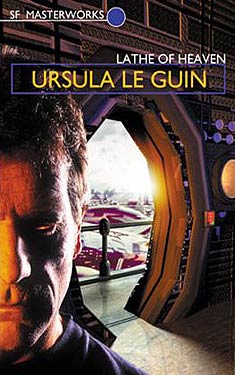Ursula K.
LeGuin
Completed 4/10/2018,
Reviewed 4/11/2018
4 stars
I enjoyed this book tremendously. It was particularly fun because it takes
place in Portland, Oregon, which is where I live now. Aside from that, it was a great story
concerning the nature of dreams and playing God. It asks the question if you had the power to
change things for the better, could you do it, and should you do it. Specifically, will there be side effects to
doings that, that without being omniscient, would cause harm rather than
good. It makes for an interesting
morality story.
 George Orr is an effective dreamer. That is, sometimes he has dreams that change
the present. Being dreams, he has no control
over them. When the present is changed,
it also changes the past and how everyone else experiences the world. For example, George has an aunt who comes to
live with his family when he is young.
He dreams she’s killed in a car accident. The next morning, she’s gone and everyone in
the family is aware that she was killed moths before. George
overdoses on meds to try to keep himself from dreaming. He gets sent to a voluntary psychiatric
analysis to avoid going to jail. The
doctor who treats him realizes that he can manipulate George’s dreams to change
the world, and begins to do so.
George Orr is an effective dreamer. That is, sometimes he has dreams that change
the present. Being dreams, he has no control
over them. When the present is changed,
it also changes the past and how everyone else experiences the world. For example, George has an aunt who comes to
live with his family when he is young.
He dreams she’s killed in a car accident. The next morning, she’s gone and everyone in
the family is aware that she was killed moths before. George
overdoses on meds to try to keep himself from dreaming. He gets sent to a voluntary psychiatric
analysis to avoid going to jail. The
doctor who treats him realizes that he can manipulate George’s dreams to change
the world, and begins to do so.
So it’s Doctor Haber who has the dreams of becoming a god
and solving the world’s problems. George
simply wants the effective dreams to end.
Dr. Haber puts George under hypnosis with an experimental dream state
enhancement device and suggests to George different things like reducing the overpopulation. But just as all dreams are uncontrollable,
the way the population reduction happens ends up a terrible calamity. George goes to a lawyer for help, and she
comes to believe he actually has this power and it is being manipulated by
Haber. Together they try to stop Haber
and put an end to George’s effective dreaming for good.
I liked George’s name, reminiscent of George Orwell. I don’t know if this was intentional, but it
invokes the idea that you can try to create a utopia, but will end up with a
dystopia if you are not careful. He’s an
interesting character, despite being rather milquetoast. It is noted at one point that he’s the
ultimate normal guy. He tests at around
the fiftieth percentile on all scales.
All he wants to do is stop dreaming, but doesn’t have the aggressiveness
needed to combat the doctor on his own.
Haber, on the other hand, is a megalomaniac, giving himself more power
through George’s dreams.
The book is quite exciting.
I enjoyed listening to Haber’s hypnotic suggestions and trying to see
what terrible variation George’s dreams were going to produce. And the final scenes are terrific. I could see this being made into a movie with
terrific special effects like “Inception”.
I give the book four stars out of five. Despite being written in 1971, it has aged
well. Anyone familiar with Portland will
recognize that LeGuin did a terrific job of making it rather timeless, to begin
with, that is. It’s exciting, but still
has the reflectiveness and subtlety that I’ve come to appreciate in LeGuin’s
novels.
No comments:
Post a Comment